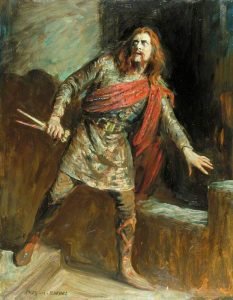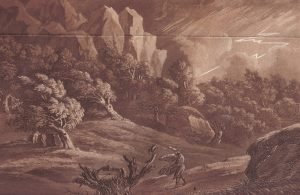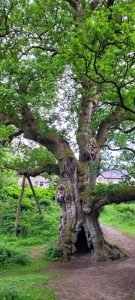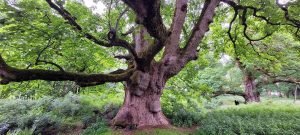Macbeth
Act 5 Sc 4
Country near Birnam Wood
Let every soldier hew him down a bough,
And bear’t before him, thereby shall we shadow
The numbers of our host, and make discovery
Err in report of us.
-Malcolm
Birnam Wood, Dunkeld, Scotland
Background - “What is past is prologue”

Herbert Beerbohm Tree (1852-1917), as Macbeth. Charles A. Buchel.
MACBETH
Macbeth is thought to have been first performed in 1606, with the original story coming from Holinshed’s Chronicles, a history of England, Scotland and Ireland published in 1577.
It tells of Macbeth’s rise to power through murder, driven by the prophecies of witches and the ambition of his wife, Lady Macbeth. It ends with his realisation of the futility of his existence and *spoiler alert* death at the hands of his enemies.
Historically the play opens in 1040 when King Duncan was killed and closes on July 27th 1054 when Siward, the Earl of Northumbria, defeated Macbeth in battle at Dunsinane. In the play Macbeth is killed but according to history he escaped with his life and ultimately met his end some three years later at the Battle of Lumphanan in Aberdeenshire. He was buried on the island of Iona.
Macbeth was almost certainly written with James I of England in mind. He was Scottish, the patron of Shakespeare’s acting company, The King’s Men, and he believed he was descended from Banquo. (The witches in the play tell Banquo that his descendants will be kings.) However, it’s now believed that Banquo was actually a fictional character created in an earlier work by the Scottish historian Hector Boece which Holinshed used as a source.
The King had a first-hand interest in witches, too. In 1590, while still James VI of Scotland, he sat at the North Berwick witch trials where dozens of women, and men, confessed, after appalling, brutal torture, to imaginary crimes, and were put to death.
On the Stage - “The play’s the thing…”

Birnam Wood, Macbeth. John Stoddart, Scenery and Manners of Scotland, 1800.
5:4 COUNTRY NEAR BIRNAM WOOD
Malcolm is on his way to find Macbeth. On the way he gives the order for his army to hack off branches from the trees growing in Birnam Wood to use as camouflage on their approach to Dunsinane, where they will do battle with Macbeth.
On the Ground - “Presume not that I am the thing I was”

The Birnam Oak
BIRNAM WOOD, PERTH AND KINROSS, SCOTLAND
Today there are no traces of the woods that were around in Macbeth’s day. And not because they were all cut down by Malcolm and his men.
There are a couple of impressive descendants, though, at the site of the original wood: the Birnam Sycamore, believed to be about 300 years old, and the slightly more famous Birnam Oak, which dates back about six centuries and so was just an acorn at around the time of the Battle of Agincourt. The oak is being held up by crutches but then so would you be if you were 600 years old. The tree’s girth is about seven metres/23 feet and the trunk is hollow to a height of three metres/10 feet.
Both stand by the south bank of the River Tay, just downstream from Dunkeld and Little Dunkeld, where there is a bridge.
It would be a natural place for Malcolm’s army to pause before crossing the river en route to Dunsinane. It’s been a crossing point since Roman times at least.
You can walk to Birnam Wood easily enough from Birnam village; just head down the narrow road to the right of the grand Birnam Hotel. The path is signposted and there are information boards once you get into the wood.
One recounts the ‘tradition’ that Shakespeare heard the story of Macbeth when he came to the area in around 1589 as a strolling player. It has also been suggested elsewhere that he was invited to Scotland as part of a troupe of players to entertain James VI in 1599. Or it could just be that he read the whole thing in Holinshed’s Chronicles.
If he had picked up the story in Scotland he might also have picked up that Macbeth’s castle, Dunsinane, isn’t pronounced as it’s spelt. Locally the pronunciation is ‘Dunsinnan’.

A younger neighbour.

